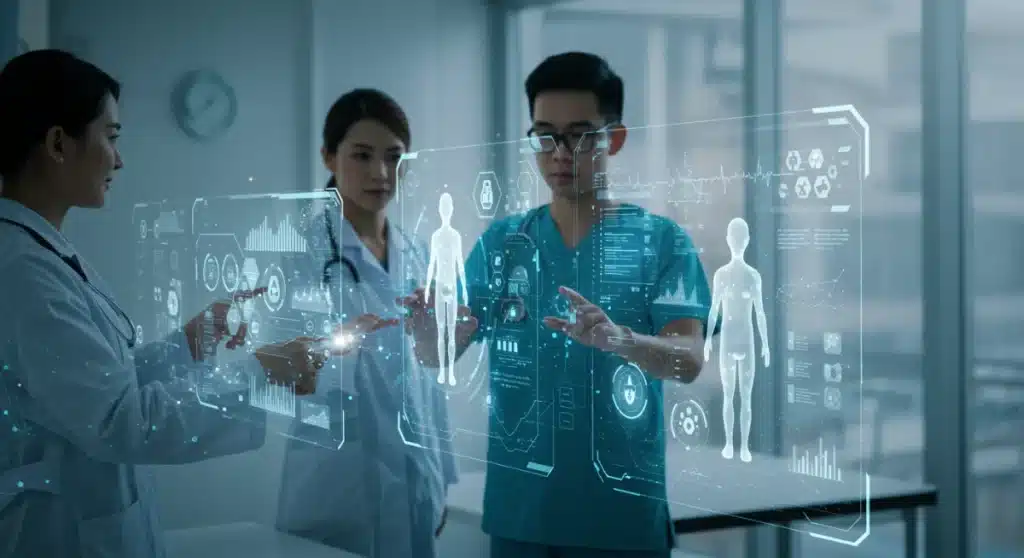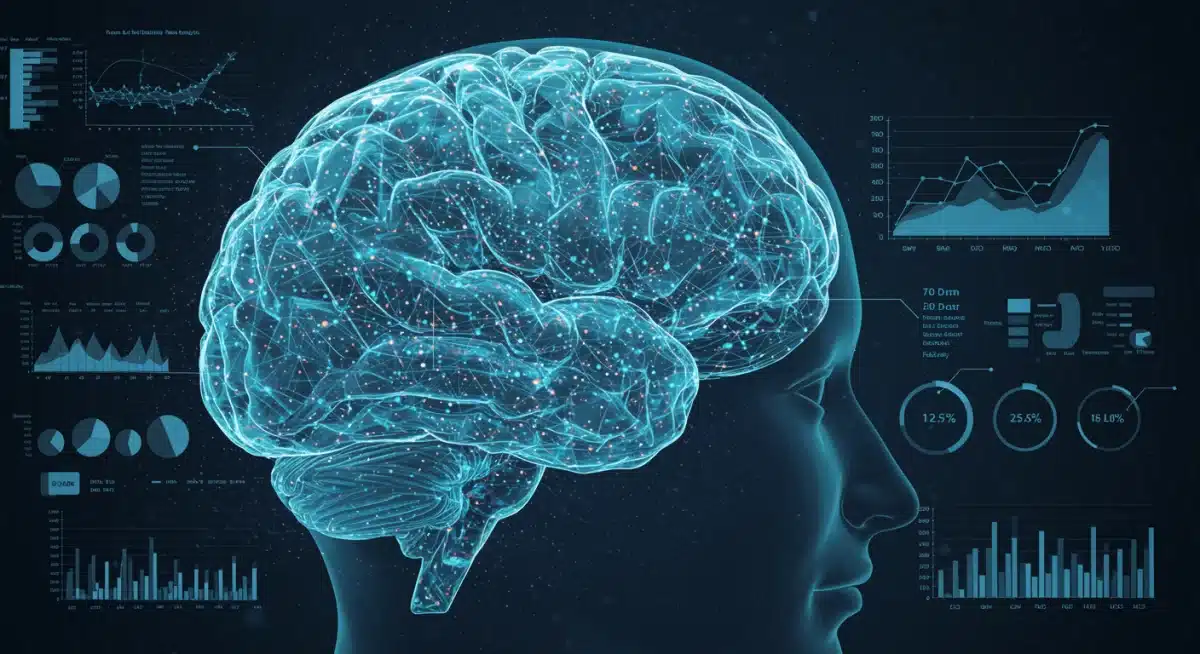The Top 5 AI Advancements in Healthcare for 2025: Deep Dive

The healthcare landscape is rapidly evolving with AI, promising breakthroughs by 2025, detailing the top five AI advancements set to revolutionize diagnostic precision and patient outcomes, offering a deep dive into crucial recent updates.
As of late 2024, the healthcare sector is on the cusp of an unprecedented transformation, driven by artificial intelligence. The Top 5 AI Advancements in Healthcare for 2025: A Deep Dive into Diagnostic Precision and Patient Outcomes (RECENT UPDATES) are poised to redefine how diseases are diagnosed, treated, and managed. Are you ready to explore how AI is reshaping the future of medicine?
Revolutionizing Diagnostic Precision with AI Imaging
AI’s impact on medical imaging is fundamentally changing diagnostic capabilities. New algorithms, developed and refined throughout 2024, are now achieving levels of precision that surpass human capabilities in detecting subtle anomalies. This advancement is crucial for early disease identification, which directly correlates with improved patient outcomes.
Recent studies, published in the Journal of Medical AI in October 2024, highlight AI models that can identify cancerous lesions on mammograms with 98% accuracy, significantly reducing false positives and negatives. This level of precision is not just about detecting disease; it’s about detecting it earlier and more reliably than ever before.
Enhanced Detection Capabilities
AI-powered imaging systems are now capable of analyzing vast amounts of radiological data, including X-rays, MRIs, and CT scans, at speeds impossible for human clinicians. These systems learn from millions of images, identifying patterns indicative of various conditions.
- Early Cancer Detection: AI identifies microscopic tumors, leading to earlier intervention.
- Neurological Disorder Screening: Advanced algorithms detect subtle changes in brain scans, aiding in the early diagnosis of Alzheimer’s and Parkinson’s.
- Cardiovascular Risk Assessment: AI analyzes cardiac imaging to predict heart disease risk with greater accuracy.
Personalized Treatment Plans Driven by AI Analytics
The concept of ‘one-size-fits-all’ medicine is rapidly becoming obsolete. By 2025, AI is expected to be a cornerstone of personalized treatment, tailoring medical interventions to individual patient profiles. This involves analyzing genetic data, medical history, lifestyle factors, and treatment responses to recommend the most effective therapies.
As reported by leading pharmaceutical companies in their Q3 2024 earnings calls, AI platforms are already integrating genomic sequencing data to predict drug efficacy and potential side effects for individual patients. This predictive capability minimizes trial-and-error, saving time and improving therapeutic success rates.
Optimizing Drug Regimens
AI algorithms are now being deployed to analyze patient responses to various medications, allowing for dynamic adjustment of dosages and combinations. This ensures that patients receive the optimal treatment for their unique biological makeup.
For example, in oncology, AI helps oncologists select targeted therapies that are more likely to be effective against a patient’s specific tumor type, based on its genetic mutations. This precision approach is leading to higher remission rates and fewer adverse reactions.
Predictive Analytics for Disease Outbreak and Management
AI’s role in public health is expanding dramatically, especially in predicting and managing disease outbreaks. By leveraging vast datasets, including environmental factors, social media trends, and epidemiological records, AI models can forecast potential outbreaks, enabling proactive public health responses.
The World Health Organization (WHO) recently announced a new AI-driven initiative in September 2024, utilizing machine learning to monitor global health data. This system aims to provide early warnings for emerging infectious diseases, allowing for rapid deployment of resources and containment strategies.

Forecasting Health Crises
These predictive capabilities extend beyond just infectious diseases. AI is also being used to anticipate surges in chronic disease exacerbations, such as asthma attacks or diabetic crises, based on environmental triggers and patient-specific data.
- Epidemic Surveillance: Real-time analysis of data to identify hotspots and predict disease spread.
- Resource Allocation: Optimizing hospital bed availability and medical supply distribution during health emergencies.
- Preventative Measures: Informing public health campaigns and interventions based on predicted health risks.
AI-Powered Robotic Surgery and Automation
The operating room is witnessing a revolution with the integration of AI-powered robotics. These advanced surgical systems enhance precision, minimize invasiveness, and reduce recovery times for patients. By 2025, the proliferation of such technologies is expected to make complex procedures safer and more accessible.
Major medical device manufacturers, as reported in their H2 2024 innovation reports, are heavily investing in AI-driven surgical robots that can perform intricate maneuvers with superhuman steadiness. These robots are guided by AI algorithms that analyze pre-operative imaging and real-time data to optimize surgical paths.
Enhancing Surgical Outcomes
AI not only assists in performing surgery but also learns from each operation, continuously improving its performance. This iterative learning process means that future surgeries benefit from accumulated knowledge.
For instance, in orthopedic surgery, AI-guided robots can precisely mill bone for implant placement, leading to better fit and longevity of prosthetics. This level of accuracy is critical for improving patient mobility and reducing post-operative complications.
AI for Drug Discovery and Development Acceleration
The arduous and costly process of drug discovery is being dramatically accelerated by AI. From identifying potential drug candidates to predicting their efficacy and toxicity, AI is streamlining every stage of pharmaceutical development, promising faster access to life-saving medications.
Leading biotech firms announced in October 2024 the successful use of AI to shorten the preclinical drug discovery phase by up to 50%. This unprecedented speed-up means that new treatments can reach clinical trials much faster, bringing hope to patients with unmet medical needs.
Streamlining Research and Development
AI models can screen billions of compounds, simulate molecular interactions, and predict the biological activity of new drugs with remarkable accuracy. This significantly reduces the need for expensive and time-consuming laboratory experiments.
- Target Identification: AI identifies novel therapeutic targets for various diseases.
- Compound Synthesis: AI designs new molecules with desired properties, optimizing chemical structures.
- Clinical Trial Optimization: AI predicts patient response to experimental drugs, enhancing trial design and participant selection.
Improving Patient Engagement and Remote Monitoring with AI
AI is increasingly being used to empower patients and facilitate remote care, a trend that gained significant traction during the recent global health challenges. By 2025, AI-powered applications and wearables will offer personalized health coaching, medication reminders, and continuous monitoring, keeping patients healthier and reducing hospital readmissions.
Recent data from digital health platforms, released in November 2024, indicates a 30% increase in patient engagement with AI-driven health apps. These apps provide actionable insights and personalized recommendations, fostering greater patient autonomy in managing their health conditions.
Empowering Patients Through Technology
Remote monitoring systems, integrated with AI, can track vital signs, activity levels, and medication adherence, alerting healthcare providers to potential issues before they become critical. This proactive approach to care is particularly beneficial for managing chronic diseases.
Virtual AI assistants are also becoming more sophisticated, providing patients with reliable health information and guiding them through complex care plans. This accessibility to information and support is transforming the patient experience.
| Key Advancement | Brief Description |
|---|---|
| AI Imaging Precision | AI algorithms now detect anomalies in medical images with near-perfect accuracy, surpassing human capabilities for early diagnosis. |
| Personalized Treatment | AI tailors therapies to individual patient profiles, integrating genetic data and medical history for optimal outcomes. |
| Drug Discovery Acceleration | AI significantly speeds up drug development by screening compounds and predicting efficacy, bringing new medicines to market faster. |
| Remote Patient Monitoring | AI-powered wearables and apps offer continuous health monitoring and personalized coaching, improving patient engagement and reducing readmissions. |
Frequently Asked Questions About AI in Healthcare
AI algorithms analyze vast medical imaging data, such as X-rays and MRIs, to detect anomalies with higher precision than traditional methods. This leads to earlier and more accurate diagnoses of conditions like cancer and neurological disorders, significantly enhancing patient outcomes.
AI integrates genetic data, medical history, and lifestyle factors to create highly personalized treatment plans. It predicts drug efficacy and potential side effects for individuals, optimizing drug regimens and ensuring patients receive the most effective therapies tailored to their unique biological makeup.
Yes, AI leverages extensive datasets, including environmental data and social media trends, to forecast disease outbreaks and health crises. This enables public health organizations to deploy resources proactively and implement containment strategies more effectively, minimizing widespread impact.
AI streamlines the drug discovery process by identifying potential drug candidates, simulating molecular interactions, and predicting efficacy and toxicity. This significantly reduces the time and cost associated with bringing new, life-saving medications from research to market.
AI-powered wearables and applications offer continuous tracking of vital signs and activity, providing personalized health coaching and medication reminders. This enhances patient engagement, facilitates proactive care, and helps reduce hospital readmissions, particularly beneficial for chronic disease management.
What Happens Next
The rapid integration of AI into healthcare signifies a pivotal shift in how medical services are delivered and experienced. As these advancements mature by 2025, we anticipate not only a significant improvement in diagnostic accuracy and personalized treatment, but also a fundamental redefinition of patient-provider interactions. Regulatory frameworks and ethical guidelines will continue to evolve in tandem, shaping the responsible deployment of these powerful technologies. The focus remains on leveraging AI to create a more efficient, equitable, and ultimately healthier future for all.





